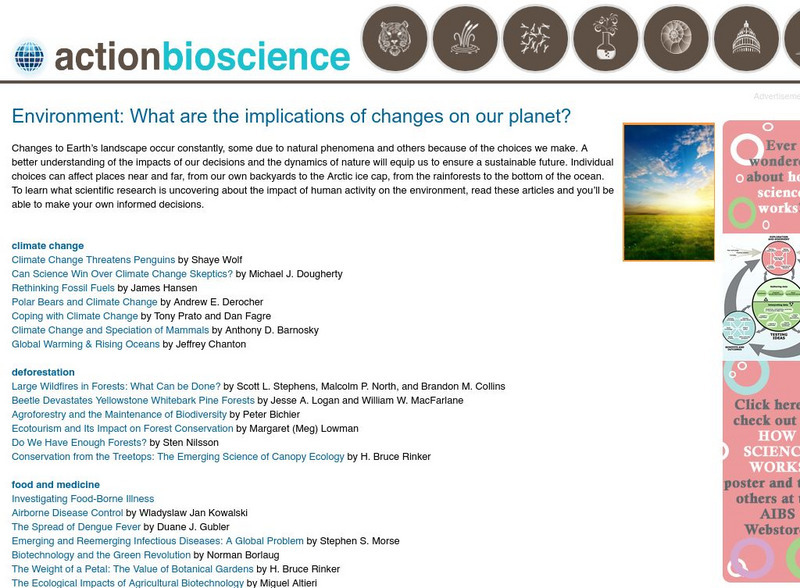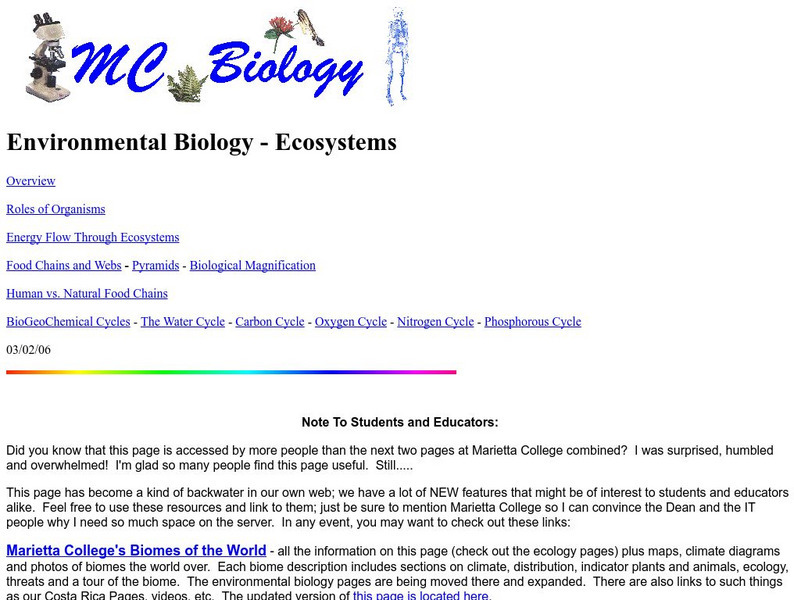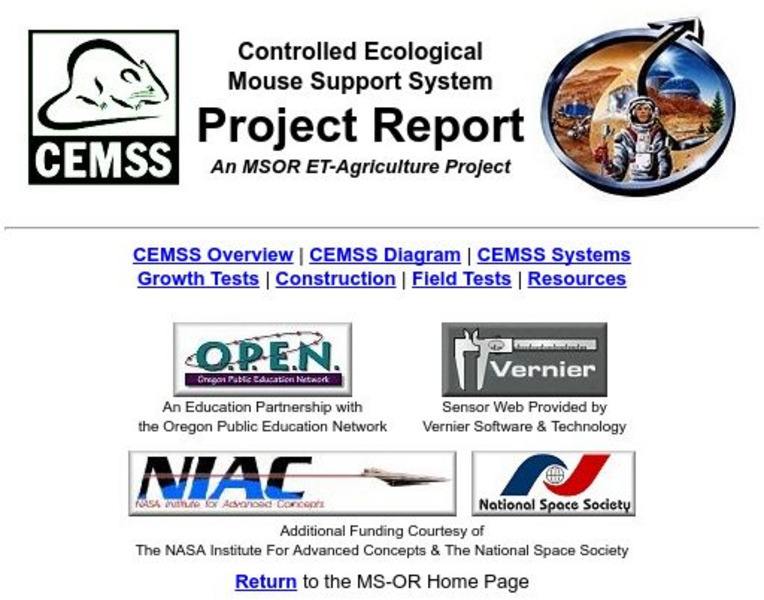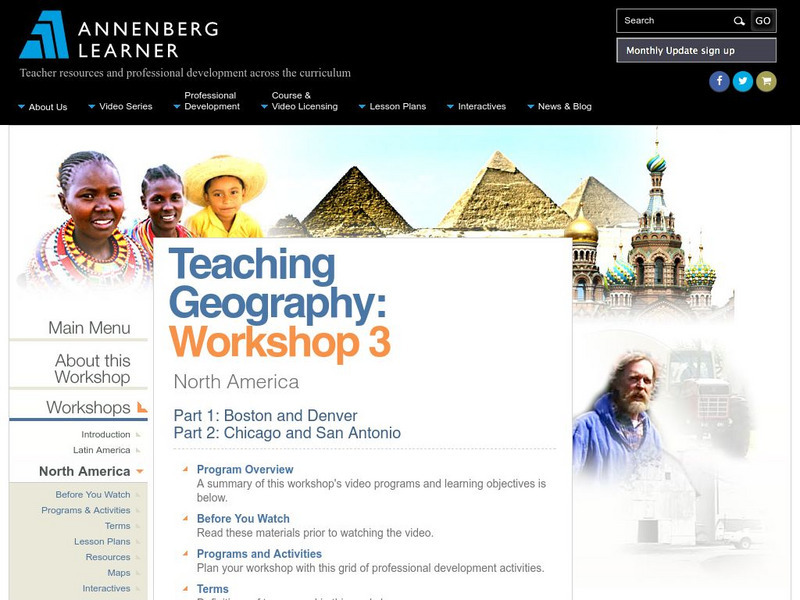Encyclopedia of Earth
Encyclopedia of Earth: Ecology: Lichen
Article describing the different categories of lichens, their physical features, how they reproduce, their evolution, and important benefits lichens provide to humans. (Published: July 19, 2010)
National Endowment for the Humanities
Neh: Edsit Ement: Folktales and Ecology: Animals & Humans in Cooperation,conflict
In this lesson plan, students will consider Folktales and Ecology: Animals and Humans in Cooperation and Conflict. Worksheets and other supporting materials can be found under the Resources tab.
Better Planet Productions
Earth Care: Reduce Your Ecological Footprint Poster Project
An assignment for students to create a poster that encourages people to reduce their ecological footprints. While it says it's for intermediate grades and up, this activity could easily be done with junior grades as well. There are links...
Untamed Science
Untamed Science: Competition
This well-written article explains what competition in an ecosystem is and the different ways it can manifest itself. It also looks at how organisms avoid competition, some disadvantages and outcomes of competition, the impact of a...
BioEd Online
Bio Ed Online: Resources and the Environment: Is It Natural or Transformed?
In this activity, students learn about natural resources. They sort materials into two categories, whether it is natural or if it has been changed by humans.
American Institute of Biological Sciences
Action Bioscience: Issues in Environment
This site from American Institute of Biological Sciences provides a collection of articles on current issues in environmental science and human impacts on the environment. Several articles available in Spanish.
CK-12 Foundation
Ck 12: Life Science: 9.18 Importance of Insects
Understand the ecological importance of insects, and why they are important to humans.
Other
Marietta College: Ecosystems
Complete illustrated discussion of energy flow within ecosystems, including discussions of trophic levels, ecological pyramids, food chains and webs, biological magnification, and cycles.
TED Talks
Ted: Ted Ed: Why Wildfires Are Necessary
Our early ancestors relied on lightning to cause forest fires, from which they could collect coals and burning sticks to help them cook food and clear land. Yet, it wasn't just humans who benefited from these natural phenomena. Even as...
Massachusetts Institute of Technology
Mit: Open Course Ware: Environmental Struggles
Identifying the relationship between humans and the environment can be emphasized with these resources.
Science Education Resource Center at Carleton College
Serc: Using Plant Surveys to Study Biodiversity
An extended field investigation intended as launch into several concepts in environmental science including biodiversity, human impacts on natural systems, and energy transfer in ecosystems.
Scholastic
Scholastic: Study Jams! Science: Ecosystems: Changes in Ecosystems
A video and a short multiple-choice quiz on the natural changes that take place in an ecosystem, and the negative impact humans can have on ecosystems.
Science Struck
Science Struck: Different Branches of Geography
Learn about the many specializations in the field of geography within its two branches of physical and human geography.
ClassFlow
Class Flow: Ecosystems and Ecology
[Free Registration/Login Required] This flipchart is a two-part lesson which teaches the students about ecosystems and changes in ecosystems. In addition, it discusses pests, pest control, and how humans change ecosystems in a positive...
Other
Mars Society: Oregon Chapter: Controlled Ecological Mouse Support System
Explore a model environment which emulates the basic workings of a bio-regenerative system. The purpose of this project is to demonstrate advanced life support systems essential for future Mars self-sustaining environments.
University of California
Ucmp: Aves Life History and Ecolog
University of California Berkeley offers a good discussion of the natural role that birds play and the importance of this role to man.
University of Chicago
American Environmental Photographs 1891 1936
An interesting site that shows early photographs by Henry Chandler Cowles and George Damon Fuller and others. The images range from ecological settings to the consequences of human changes to the environment.
Encyclopedia of Earth
Encyclopedia of Earth: Ecotoxicology: Herbicide
Definition of herbicides, how they are used, their damage to the environment and to ecology, consequences to human health, use around the world, and the three classes of herbicides.
Nature Research
Nature Education: Energy Economics in Ecosystems
This article discusses how plants and microorganisms, until recently, have mostly controlled how much carbon dioxide is released into an ecosystem, and explains how this process works. Humans' burning of fossil fuels has upset the...
Annenberg Foundation
Annenberg Learner: Teaching Geography: North America
Media-rich site that explores North America. The first part of this workshop focuses on the general human behavior in urban settings looking for and interpreting those patterns. The second portion draws attention to urban issues such as...
University of California
Ucmp: Introduction to the Carnivora
Nice informational site about the order Carnivora. The opening page lists members of the order and briefly describes relationships between humans and carnivores. It links to pages on evolution of carnivores, the ecological roles of...
US Geological Survey
U.s. Geological Survey: Groundwater Information by Topic
A massive amount of information about groundwater. Topics covered include groundwater basics, humans and groundwater, groundwater quality, and its place in the water cycle. Includes true-and-false quiz and a Q&A section, as well as a...
Other
Ohio Dept. Of Education: Our Grasslands
This excellent unit of study for Grade Two has students examining what makes up a grasslands environment, growing their own grass, playing a predator-prey game, and looking at how grasslands are impacted by human activities.
CK-12 Foundation
Ck 12: Life Science: Role of Amphibians
[Free Registration/Login may be required to access all resource tools.] Humans have used amphibians for a number of purposes for thousands of years, if not longer. Amphibians play significant roles in many food webs and are thus an...





















